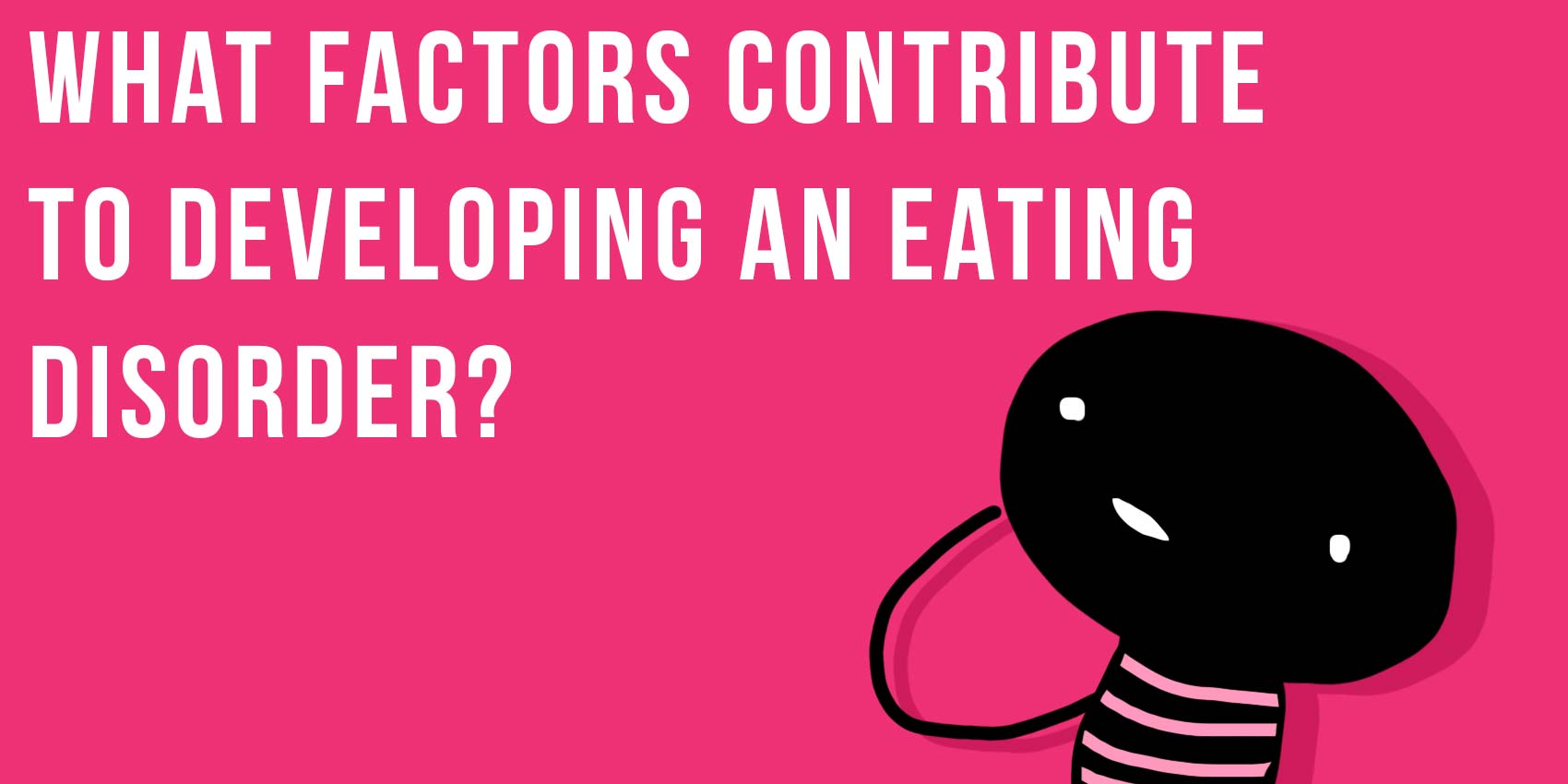07 Feb What factors lead to an eating disorder?

Just what exactly causes an eating disorder is unknown. It is a very complex issue and many factors may be involved in its development. Below you will read about the factors and circumstances that are commonly believed to contribute to the development of an eating disorder. Just how much each factor plays a part will differ from person to person.
- Dieting and starvation. Dieting is one of the main risks to developing an eating disorder. What can happen is that when people start to diet, they can restrict their eating in unhealthy ways—ways that are similar to starvation. When people are starving, they don’t get enough nutrients for their bodies and brains to function well. When the brain does not receive enough nutrients, changes occur in the brain that can lead to anxiety, mood changes and rigid thinking. Those very changes then create a negative cycle that supports the eating disorder. Here’s how it happens: Unhappy with her body, a girl diets to lose weight. Her dieting causes her brain to change. The brain changes literally then cause a change in her thinking, such as rigid thinking, which means she makes up rules like “I can’t eat ANY fats,” and “I can only eat 350 calories a day.” Those rules severely restrict her eating, causing a lack of nutrients to her brain which locks in the rigid thinking. She is therefore MORE likely to create more rigid rules and stick to them. Can you see the cycle created? This is why proper nutrition is so key to your brain and body! Setting up healthy eating habits now can help you to keep both your body and mind strong, avoiding this conundrum (meaning, a tricky situation that has a “what came first, the chicken or the egg?” quality to it). Click here to learn more about proper nutrition.
- Stress—real or perceived. A lack of stress management skills can leave someone vulnerable (meaning, more at risk) to developing an eating disorder. Recall that the average onset of anorexia occurs during the transition time from middle school to high school. Meanwhile, the riskiest time for developing bulimia is during the transition from high school to college. Transition times are stressful for some people. Stress can often make people feel vulnerable and powerless to control things. A lack of control is also a cause of stress—another conundrum! For some, controlling their eating is a way to gain some control in their lives. But this isn’t the kind of control that will help. A better solution would be to manage the stress in healthy proactive ways and to use stress reduction techniques. Click here and here to read about those respectively. Learning about what you can and cannot control is also helpful and that can be found here.
- Body changes: The risk of anorexia is highest just when girls are undergoing puberty. Some experts think that the body changes that happen during puberty cause some girls anxiety: they may not want their bodies to change. To stop those changes, girls may starve themselves and/or vomit. Others suspect that the hormonal changes that take place at puberty may trigger an eating disorder. For example, one way this may happen is through the increase in estrogen during puberty. Estrogen can sometimes cause mood swings and experts hypothesize (meaning make an educated guess) that some girls may manage the uncomfortable feelings caused but those mood swings by focusing on food and weight. Knowing what is happening as you go through puberty can be helpful in reducing stress. Being accepting of your body in general can also go a long way in preventing any unhealthy reactions to the changes in your body. Click here to read about body image and here to read about puberty,
- Society pressures: People in the western world (which generally means, the Americas and Europe) fear being fat. Even very young children rate drawings of fat children more negatively than drawings of children with physical disabilities. Indeed, Western culture prizes beauty above health and therefore, young teens who are trying to “fit in” or be “popular” will often focus on what their culture tells them is important: looks and weight. Today this is exacerbated (meaning, made worse) by social media where the pressure to look good and be thin is almost everywhere. But you don’t have to give into this pressure! The post on body image includes information about how our society values thinness. But, in the past ten years, social media has caused young women and men to be bombarded with unrealistic “ideal” images. As a result, the pressure to be thin may be greater than ever as the exposure to such images is greater than ever. What matters is that you feel good in the skin you’re in and that’s more about your internal thoughts than anything else. And guess what? You have control over them! (See Chapters 2 and 3 in the YSS Discover Your Self book for more on this.)
(Source: Richardson, S. A., Goodman, N., Hastorf, A. H. and Dornbusch, S. M. (1961) Cultural uniformity in reaction to physical disabilities. American Sociological Review , 26, 241–247.)
- Family history and dynamics: Individuals with a parent or sibling who has had an eating disorder are significantly more likely to develop one as well. What is unknown is whether this is caused by genetic factors or by learned behaviors/family dynamics. For instance, if your mom had an eating disorder and restricts her eating, she may teach you to restrict your eating and to value being thin, leaving you more at risk for an eating disorder (not that it is intentional, but more because that is who she is and she may not be aware that it is causing the issues). Whatever the dynamics of the family, because families are a major source of psychological and emotional support, effective treatment of eating disorders usually includes the help of family members. Solid communication is a good first step to a supportive family environment. How is your family being supportive of you? Do you communicate with your family about how well you feel they are supporting you and honoring your feelings? (See Chapter 3, Your Family in Manage Your Self and Chapter 2 in the YSS Express Your Self book for more on these areas.)
(Source: https://www.mayoclinic.org/diseases-conditions/eating-disorders/symptoms-causes/syc-20353603)
Whatever the underlying cause may be—one of the above, a combination of them, or something entirely different—at the core, eating disorders happen when people do not feel good enough in some way. That’s why we hope that everyone can develop a strong sense of self and know they are loved and valued.




Answer the post question here
What's being said